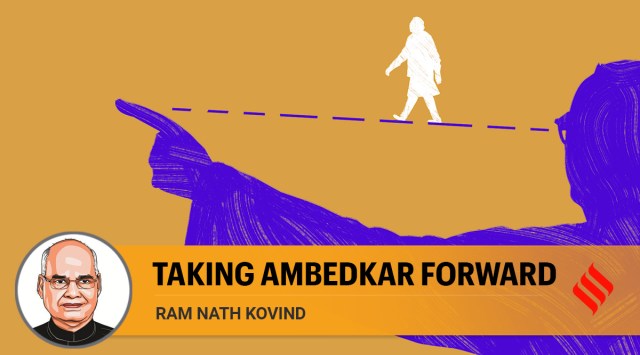
As India celebrates 75 years of its Independence, it is an opportune moment to remember the father of our Constitution, Babasaheb Bhimrao Ambedkar, who gave wings to the dreams and aspirations of the weaker and poorer sections of our society. Though governments have contributed toward nation-building since Independence, it is the Narendra Modi government that has realised the unfulfilled dreams of Babasaheb Ambedkar.
Today is also the birthday of our beloved Prime Minister, with whom I have had a long and memorable association. I have seen him work as an organisation man, chief minister and now as Prime Minister of India. PM Modi’s zeal and his monumental work for the uplift of the downtrodden and weaker sections of our society — his concern for Dalits, Adivasis and women — impressed me the most. As a true disciple of Babasaheb, he has been striving hard to make India an egalitarian society.
The influence of Ambedkar on Modi is clearly visible in all his actions, programmes and policies. He has always followed the path shown by Babasaheb. In the form of “Panchteerth”, PM Modi has given the nation and the world a gift. It is Modi who not only decided to celebrate the birth anniversary of Babasaheb as “Samrasta Diwas” but also gave India its Constitution Day on November 26. It was at the initiative of PM Modi that the United Nations celebrated Babasaheb’s 125th birth anniversary.
Two important actions of the Narendra Modi Government which realise the unfulfilled missions of Babasaheb Ambedkar are the abolition of Article 370 and the making of Atmanirbhar Bharat.
Despite the strong objections of Ambedkar, Article 370 became part of our Constitution, which stalled the integration of Jammu and Kashmir with India. It is due to the commitment and willpower of PM Modi that Article 370 was abrogated thus leading to the unification of Jammu and Kashmir with India.
PM Modi has been working on a mission mode to make a strong, self-reliant India. Ambedkar knew that only an “Atmanirbhar Bharat” can be a developed nation. Previous governments lacked the will and commitment to take India on the path of self-reliance. It is PM Modi who started this course correction and showcased to the world the prowess of India. Today, the world acknowledges our strength.
As President of India, whenever I used to interact with PM Modi regarding social issues and governance, it was the deep-rooted corruption in our system that worried him the most. He used to say that it is the poor who suffer the most as a result of this. In the past eight years, we have seen PM Modi waging a decisive battle against corruption and ensuring that the fruits of all the government schemes reach the poorest of the poor. Today, beneficiaries of government schemes get money directly transferred into their accounts. All the schemes of the Narendra Modi Government reflect compassion for the poorest of the poor.
Another area of deep concern for PM Modi is the control of our democratic system by dynasty politics. He has always been vocal about how dynasty politics has been usurping the rights of genuine and hardworking political workers. First, as an organisation man, later as Chief Minister of Gujarat and now as Prime Minister, Narendra Modi has always promoted leaders and workers based on merit. The war that he has waged against dynastic politics has already started to show its impact. Merit-based — not DNA-based — politics will make our democracy more vibrant and stronger.
The democratisation of the Padma Awards typifies the Modi style of governance. From being awards that looked like “extraneous considerations” for the affluent class, the Padma Awards have now found their lost connection to the “aam aadmi”. These awards are now specifically dedicated to those who are rooted and down to earth.
I would also like to mention two of the important initiatives of the Narendra Modi government that have written a new chapter of growth and development in the most backward areas and impacted the lives of those at the bottom of the pyramid — the Aspirational District Programme and the Adarsh Gram Yojna. It is PM Modi’s unique quality to think out-of-the-box, his impeccable planning and flawless execution have brought tangible changes to the lives of the poorest. Several social welfare schemes are great examples of this. The most prominent, perhaps, is the Pradhanmantri Gareeb Kalyan Anna Yojna, the world’s largest free ration scheme that has benefited over 80 crore people as Indians valiantly fought the Covid-19 pandemic.
I have seen closely how PM Modi led from the front in India’s fight against the deadly virus. It was due to his hand-holding and encouragement that our scientists and doctors succeeded in developing not one but two Made in India vaccines, which not only gave us a safety cover but also helped several other nations. The PM undertook the mammoth task of vaccinating over 100 crore Indians when the pandemic was at its peak, thus kickstarting the world’s largest and fastest vaccination programme. When Covid paralysed developed countries, PM Modi strengthened and expanded our health infrastructure. Through his timely policy initiatives, the PM also ensured that our economic growth is not stifled.
The last eight years under PM Modi have been remarkable. He draws inspiration from several leaders, but the imprint of Babasaheb Ambedkar on his style of governance is omnipresent. I see PM Modi as a true follower of Bharat Ratna Ambedkar, who used to say that Indianness is our true identity and to build a strong nation we all have to rise above caste, creed and religion. Following the footsteps of B R Ambedkar, our Prime Minister has made “Nation First” his motto, while good governance, social cohesiveness and discipline are the hallmarks of his government.
The writer is former President of India